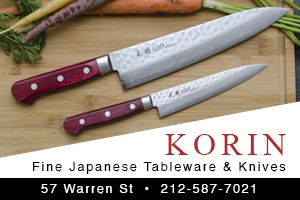From Tokyo to Tribeca
 Masako Chiba first set foot in New York in 1999, for what was supposed to be a year-long stint. After the year was up, however, she was so smitten by the city that she refused to move back to her native Tokyo—instead, she got a job at a Japanese travel agency. Fast-forward ten years, and she’s now the proud owner of Bit’z Kids, a clothing-and-accessories store for newborns to eight-year-olds. We sat down for a conversation about why going to the doctor makes her wistful for Japan, her take on street performers, and things she loves about New York City.
Masako Chiba first set foot in New York in 1999, for what was supposed to be a year-long stint. After the year was up, however, she was so smitten by the city that she refused to move back to her native Tokyo—instead, she got a job at a Japanese travel agency. Fast-forward ten years, and she’s now the proud owner of Bit’z Kids, a clothing-and-accessories store for newborns to eight-year-olds. We sat down for a conversation about why going to the doctor makes her wistful for Japan, her take on street performers, and things she loves about New York City.
You fell in love with the city in less than a year. What was it that won you over?
Most people In Japan were born there and live there their whole lives. But New York is made up of people who wanted to live here—who had a dream and moved here to make it a reality. I think this gives the city power and energy. Even the street performers are here to fulfill their dreams. They have great talent and it makes me happy to watch them. Tokyo is a busy city, too, but it’s full of businessmen who seem so exhausted. They have no life to them.
I assume it wasn’t all easy in the beginning though. Were there any major struggles?
Communication was definitely a problem. It annoyed me because, like every Japanese student, I studied English in school for six years, but when I got here I couldn’t communicate and it was very frustrating. Also, I couldn’t find any clothes in my size. Everything was too big and too long.
And did you miss Japan? Miss the food or your family?
I definitely missed my family, but the food wasn’t that difficult because in Japan we eat white rice every day and it’s easy to find. Also, in New York it’s very easy to find Japanese food and Japanese DVDs. I also worked with other Japanese people. At times I forgot I was in the U.S., until I went outside.
What notions did you have about the city that didn’t turn out to the true?
I thought it was very unsafe. In fact, my parents were horrified when I told them I was moving here. I was pleasantly surprised to dicsover that I could walk around by myself or take the subway. I didn’t think I would be able to do either of those things.
Were there unexpected disappointments?
Health insurance. In Japan, health care is not free, but it’s heavily government-supported. It costs $5 to go to the doctor and for kids it’s completely free. Medications for kids are free, too, in many districts. Every time I go to the doctor here I worry about getting a huge bill.
What are some other differences between Japan and the U.S.?
Generally everyone in Japan is Japanese, but in the U.S., especially in New York, there is such a mix of cultures and races. I don’t even feel like a foreigner here. That’s the biggest difference. Also, Japan is much cleaner. The subway is comfortable and clean. My five-year-old daughter commented when she went to Japan that everything there is so clean and beautiful, even the subways.
Do you identify more with Americans now or Japanese?
It’s been almost 12 years and I think I feel more American now. I notice the smallness of everything in Japan: the elevators, buses, food portions at restaurants. Sometimes I feel like I need to eat more when I’m there. And it annoys me that Japanese people won’t say what they’re really feeling. If it’s lunchtime and a meeting is going on and on, no one will speak up and say it’s time to break for lunch. They will just wait.
Are there things about New York that you wish were more like Japan?
Yes, everything runs on schedule there. The trains come every two to three minutes, and if they’re late for some reason there is an apologetic announcement. People line up in an orderly fashion for elevators and subways. And lots of things are cheaper in Tokyo than in New York City: rent, food, clothes. But the crowds and traffic are way worse. There are actually pushers in subway stations to squeeze as many people on to the trains as possible.
That sounds terribly uncomfortable. Why did you choose to open your store—your second in the city—in Tribeca?
I got to know Tribeca because I commuted from my home in Jersey City to my first store on the Upper West Side every day. I noticed there was a high-income population here, and since there were some good public schools in the neighborhood there were also lots of kids. It was time to expand and we thought about the Upper East Side and Tribeca and decided to come here because many Upper East Siders were already coming to our Upper West Side store
Have you ever felt like it’s too difficult being so far away from home? That you wanted to move back?
Yes, many times. The winters are hard. In Tokyo, the temperature barely dips below freezing. And there have been times when my daughter was sick and I thought of how much easier it would have been with my family around. But I push myself and stay because my business is expanding. Plus, it’s hard for women over the age of 32 to find a job in Japan. There are age requirements for jobs there, and I recently ran a Web search out of curiosity. There were zero jobs for women my age, but when I changed the age to 29 there were lots of listings
Do you ever feel like an outsider here after all these years?
Sometimes. I haven’t applied for citizenship yet, and since my daughter and husband were both born here, I’m the only one fingerprinted when we enter the country. Also, I don’t feel that strongly about Thanksgiving. New Year’s is the big holiday in Japan and everything is usually closed till January 5 or 6. It’s always kind of a shock for me to go back to work on January 2.
What are some good places to get Japanese food in New York?
In Tribeca, Megu is fantastic. Almost everything there—the meat, fish, seasonings—is imported directly from Japan. That’s why it’s expensive. But it’s all authentic. I also like Takahachi and Takahachi Bakery, which is just like a bakery you would find in Japan. I recommend the anpan, a pastry with red-bean paste inside.
Anything else you love about New York City?
I love how friendly the people are. I know New Yorkers aren’t considered to be friendly, but I’ve always had someone run over to help me if I have a stroller on the subway. And you can’t open a map in New York without someone running over to ask if you need directions. I love that. In Japan, no one speaks to strangers.
On weekends, Bit’z Kids hosts activities like origami, magic, and music classes. Call the store for details or sign up for the mailing list at bitzkidsnyc.com. Also, in the aftermath of the recent Japanese earthquake, Bit’z Kids has launched a website to help with donations and finding family and friends in Japan: bitzkidsnyc.com/632/SAVE_JAPAN_!
 About the author: Anojja Shah (left) is a Tribeca mom who spends her days running after a feisty 3-year-old. In past lives she worked as a journalist and on Wall Street in equity research. This Q&A is her third in a series of interviews with immigrants who live and/or work in Tribeca.
About the author: Anojja Shah (left) is a Tribeca mom who spends her days running after a feisty 3-year-old. In past lives she worked as a journalist and on Wall Street in equity research. This Q&A is her third in a series of interviews with immigrants who live and/or work in Tribeca.
Previous “I → NY” interviews:
••• From East Java to Tribeca: Rinta Juwana
••• From Montreal to Tribeca: Sarah Mlynowski













